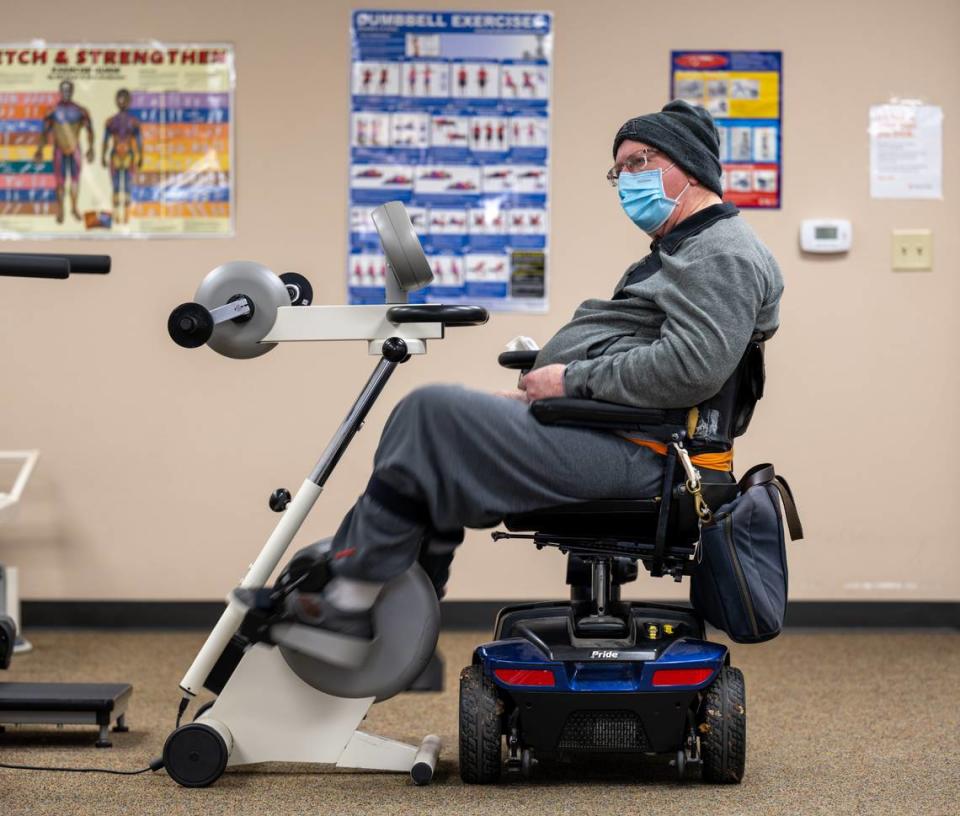Book of Dreams: Sacramento center provides physical, emotional support for people with MS
Every day, a group of tough-minded people of all ages meets in a medical building in Citrus Heights. You might call it the Fight Club.
There, at the Multiple Sclerosis Achievement Center, people dealing with chronic and incurable disease work on their bodies, their minds and their psyches with a simple objective: To fight back against a powerful neurological disorder.
The achievement center on Greenback Lane, one of three similar centers nationally, offers weekly five-hour group exercise sessions for both minds and bodies to help people with multiple sclerosis maintain the best quality of life as long as possible. The achievement center also provides a nurturing haven of companionship and understanding where people with a shared affliction can gather and talk.
Now, the multiple sclerosis achievement center can use some help. As the COVID pandemic recedes, the program finds itself gearing up to handle more “members” with more needs.
The achievement center is asking The Sacramento Bee’s readers for $15,000 in donations through the newspaper’s annual Book of Dreams program to upgrade some of its exercise equipment.
An exercise bottleneck
Notably, achievement center director Brian Hutchinson said his team wants to buy a popular and useful exercise device called a MotoMed. The achievement center already has one MotoMed, but patients must wait to use it on busy days, creating a bottleneck during the tightly run exercise sessions.
In its request, the achievement center wrote: “There is urgent need for a second MotoMed, which provides active assisted mobility to impaired members, so more can benefit from its use.The MotoMed allows users with little to no active movement of their extremities, to participate in exercise by moving lower or upper extremities that otherwise would not be able to move or movement would be limited by fatigue.
“Users ‘pedal’ along with the motor to get ‘active assisted’ movement, benefits of which include improved range of motion and blood flow (decreasing the risk of blood clots and swelling), and help with muscle relaxation allowing extremities to be ‘moved’’ easier by family and caregivers.”
“It’s ideal for patients who can’t use the treadmill or exercise bike,” director Hutchinson said. “But they can do 30 minutes on this, and you can tell the difference afterward.”
Last week, as he does every week, 78-year-old Terry Farmer sat at the MotoMed as the machine methodically forced his leg muscles to expand and contract up and down and forward and back.
Farmer’s disorder is advanced. He can’t pedal, so he sits as the machine rotates his legs on its own. “For people like me, it pumps your blood around,” he said.
Farmer, a former county district attorney in Northern California, first noticed signs of the disorder when he was 21. Unlike many with multiple sclerosis, he managed to continue a long and fulfilling career, but in the last decade, the disorder has taken a toll on him, leaving him largely immobile.
“It started slowly,” he said. “It got worse one day at a time. It got so I couldn’t walk, and then I couldn’t stand up, and that got me into a wheelchair.” His right hand still works, but his left hand doesn’t.
“It’s a drag,” he said, “but it’s not going to kill you.”
Help cope with MS
Farmer is one of nearly 1 million people in the United States now dealing with multiple sclerosis, a number that is on the rise, according to a 2019 study by the National Multiple Sclerosis Society.
In its application for Book of Dreams funding, the center staff wrote: “MS is an unpredictable, often-debilitating neurological disease that can leave its sufferers isolated, depressed and limited. Impacts range from minor inconvenience to quadriplegia.”
“Those impacts can often derail their ability to continue with meaningful income earning,” center officials wrote. “As a result, many are on limited or fixed income and the disease limits their options.”
The center, which currently serves about 70 people, accepts patients from all health providers. It is affiliated with the non-profit Dignity Health network, and is funded in part by the Mercy Foundation.
But that funding doesn’t fill all the center’s needs, Hutchinson said, leaving the center with an annual deficit. Member fees are on a sliding scale to ensure no one is turned away due to financial constraints, Hutchinson said.
Although multiple sclerosis is rarely a direct cause of death, the severe physical limitations it imposes on some people can create a sedentary lifestyle that can foster other problems that lead to morbidity and death, Hutchinson said.
“We try to provide people the ability to maintain function over time,” Hutchinson said. “This is how you manage the disease. You slow its progression. This is a way you can be active as long as you can.”
Book of Dreams
The request: The Multiple Sclerosis Achievement Center has asked readers for $15,000 so it can buy more exercise equipment, including a MotoMed machine that provides movement therapy for people with MS.
How to help: You can make a donation at sacbee.com/bookofdreams.

 Yahoo Movies
Yahoo Movies 



